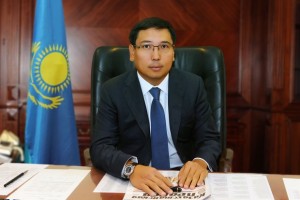ASTANA – Kazakhstan plans to carry out 33 comprehensive reform projects in certain institutions and sectors of the economy with the help of international financial institutions. These lofty goals were set as part of the country’s efforts to improve access to infrastructure, strengthen the financial sector and support the diversification and competitiveness of its economy.
“In order to increase the competitiveness of Kazakhstan’s economy, these institutional and structural reforms will be accelerated. They are focused on improving the business climate in the country, improving the investment climate and promoting key economic sectorsand tariff policies in conjunction with the European Bank for Reconstruction and Development (EBRD),” Minister of National Economy Yerbolat Dossayev said during a press conference in Astana on Feb. 19.
Dossayev made it clear that one government priority for 2015 is the implementation of structural reforms ensuring sustainable economic development and social stability. The minister also reported that the implementation of the partnership agreementswith international financial institutions (IFIs)on these reforms will continue this year with an emphasis on promotingscience and innovation, improving education, healthcare, public utilities, energy efficiency, businessand the investment climate, as well as stimulating the growth of small- and medium-sized enterprises (SMEs).
The agreements between Kazakhstan and the IFIs define the fundamental principles of the partnerships and joint activities of the parties in supporting Kazakhstan’s development strategies. According to the co-financing arrangements, the IFIs will lend a total of 322 billion tenge (US$1.74 billion), while Kazakhstan’s government will allocate 39.2 billion tenge(more than US$211 million) to carry out the joint projects.
Between 2015 and 2017, eightjoint public utilities projects totaling 91 billion tenge (US$492 million) will be implemented. To help spur SME growth in Kazakhstan, credit lines totaling 92.5 billion tenge (US$499.6 million) will be supported by the participating IFIs. The Asian Development Bank is providing a 24 billion tenge (US$129.58 million) loan to support small- and medium-sized businesses through the Damu Entrepreneurship Development Fund. The EBRD is lending 10 billion tenge (US$54 million)toCentre Credit Bank for this purpose.
The World Bank is allocating $21.7 million to help increase Kazakhstan’s energy efficiency. Most of the funds, $17 million to be exact, will be spent on installing green technology at 70 public facilities. Steps will also be taken to improve the institutional framework regarding energy efficiency as well as develop and implement sustainable energy financingmechanisms.
Some of the projects launched earlier and co-financed by the World Bank have been extended to increase their results. Some of the most significant outcomes entailing complex institutional changes are expected in the health sector, technology transfers and institutional reform projects and an institutional strengthening project in the justice system, tax administration reform and a customs development project.

